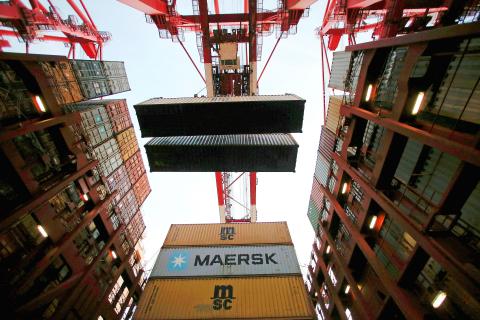With the US having imposed 10 percent tariffs on US$200 billion worth of Chinese goods, which are expected to increase to 25 percent starting from next year, a large number of Chinese companies are implementing measures to conceal the manufacturing location of their products, such as transiting shipments through ports in intermediary countries, to circumvent US customs duties. There is even a guide circulating online which informs Chinese companies how to evade the tariffs. The guidance recommends that Chinese manufacturers should “Work with importers and exporters in Southeast Asian countries which can provide all the necessary manufacturing origin certification required to avoid US anti-dumping duties and maximize profits.
The step-by-step guide teaches Chinese manufacturers how to illegally transit goods through other countries while claiming that it is nothing more than “altering the trading entity to legally avoid tariffs.” The guide emphasizes that goods must not be directly shipped to the destination port, but instead must be shipped via an intermediary port in another country. The goods should then be transferred into new containers and a full set of local certificates and other documentation should be obtained to achieve customs clearance at the destination port.
Since such methods are illegal, the guide advises that outer packaging of goods must be quite plain or indicate the name of the intermediary country from which the goods were shipped and must never contain “Made in China” markings or any recognizable elements that would link production to China.

Photo: Reuters
照片:路透
The guide also says, “to put it in simpler terms, we will operate like a third party company, in much the same way as trading companies in places like Southeast Asian countries buy products from us and then send them on the US, it’s just that we will be earning money from the commission, as we alone will be responsible for handling the procedure.”
As the US-China trade war intensifies, while Taiwan is benefiting from Taiwanese companies relocating their manufacturing operations from China back to Taiwan in addition to increased transiting through Taiwanese ports, there is also a danger that Chinese companies will illegally transfer their goods through Taiwan to obscure their manufacturing location. Some fear this could mean that Taiwan becomes dragged into the US sanction regime and is itself blacklisted.
According to the Customs Administration, in the first half of September customs officers registered a total of 2,319 “irregular” goods items transiting through Taiwan, at a value of NT$54.46 million (aprox. US$1.75 million). The administration is currently carrying out a joint investigation with the Bureau of Foreign Trade. Officials at the bureau have revealed that it has already beefed up preventative measures for goods that are deemed to be highly susceptible to illegal transiting.

Photo: Reuters
照片:路透
(Translated by Edward Jones, Taipei Times)
美國對中國兩千多億美元商品課徵百分之十的關稅,中國產品明年起將統一面臨百分之二十五的高關稅,為規避關稅,中國有不少貿易商已祭出「第三地轉口」的洗產地措施,甚至連網路上都有教戰守則招攬生意,強調「可以通過東南亞國家的某些進出口廠商配合」、「出示全套產地單證等,避開反傾銷關稅,提高利潤空間」。
文章一步步教導中國廠商非法轉口,並公開宣稱只是「轉換貿易主體合法避稅」。該文章強調,貨物不直接到目的港,「而是繞中轉港,在中轉港口完成換櫃,配套中轉國的原產地證書及出口文件,為目的港客戶提供清關文件」。
因為非法轉口,教程也指出「包裝上用中性包裝,或者註明第三國產地,不能有中國製造標識,或能辨識是中國的產品」。
該文章也明文點出,「簡單一點就是第三方公司,就相當於是東南亞等地的貿易公司,向我們採購之後再轉賣給美國,一樣處理方式,只是利潤變成了我們的代理費用,操作上我們把關而已。」
美中貿易戰擴大,台灣雖然受惠台商返台及轉口效應,但也出現中國產品違法經台轉口「洗產地」危機,恐造成台灣同被列入制裁清單。
根據關務署統計,九月上半月海關已申報二三一九項、價格五四四六萬元涉及違規轉運貨品,目前正與貿易局合作追查處理。貿易局官員透露,對較易遭違法轉口的產品,貿易局已祭出更嚴格措施來避免轉口。
(自由時報記者黃佩君)
Follow Up
讀後練習
US-China Trade War
The US and China have become locked in a tit-for-tat trade war after US President Donald Trump promised during his election campaign to stop China’s “longtime abuse” of the international trade system and its “rape” of US industry.
After diplomacy, talks and state visits — including Trump feeding Chinese President Xi Jinping (習近平) the “world’s best chocolate cake” — failed to resolve differences, in January Trump imposed a tariff on solar panel imports, most of which are produced in China.
This was followed in July by 25 percent tariffs specifically targeted at US$34 billion of Chinese goods. After Beijing responded with reciprocal tariffs on an equivalent value of US goods, Washington slapped tariffs on an additional US$16 billion of Chinese goods in August — which was matched by China — and then a further US$200 billion of tariffs, which came into force last month. While China’s economy is starting to show signs of slowing down, only time will tell to what extent US trade sanctions will impact China’s economy.
(Edward Jones, Taipei Times)

Rice is essential to Japanese culture, tradition and politics. People take pride in the oval-shaped sticky Japonica grain, which is still a staple even though total consumption has fallen over the decades. But since last summer, prices have soared as supplies have fallen short of demand. The government has long paid farmers to cut back on rice acreage, and change to other crops to keep rice prices relatively high. To cope with shortfalls this year, the government has released rice reserves. But the grain has been slow to reach supermarket shelves. Anger over that was part of the reason the Agriculture Minister

Step into any corner of Turkiye, and you’ll likely encounter the iconic “Evil Eye,” known as “nazar boncu?u” in Turkish. This striking blue glass ornament is shaped like an eye with concentric circles of dark blue, white, and light blue. While its name in English suggests something threatening, it’s actually a charm designed to ward off misfortune. The origins of the nazar boncu?u can be traced back to ancient Mediterranean and Middle Eastern traditions. The word nazar comes from Arabic, meaning “gaze,” while boncu?u translates to “bead” in Turkish. Central to the nazar boncu?u’s mythology is the idea that

A: Wow, Les Miserables Staged Concert Spectacular is visiting Taiwan for the first time. B: Isn’t Les Miserables often praised as one of the world’s four greatest musicals? A: Yup. Its concert is touring Taipei from tonight to July 6, and Kaohsiung between July 10 and 27. B: The English version of the French musical, based on writer Victor Hugo’s masterpiece, has been a huge success throughout the four decades since its debut in 1985. A: The musical has never toured Taiwan, but going to the concert sounds like fun, too. A: 哇,音樂劇《悲慘世界》紀念版音樂會首度來台巡演! B: 《悲慘世界》……它不是常被譽為全球四大名劇之一嗎? A: 對啊音樂會將從今晚到7月6日在台北演出,從7月10日到27日在高雄演出。 B: 這部法文音樂劇的英文版,改編自維克多雨果的同名小說,自1985年首演以來,在過去40年造成轟動。 A:

A: While hit musical Les Miserables’ concert tour kicks off, South Korean drama Squid Game 3 will be back at the end of this month. B: New Taiwanese dramas The World Between Us 2 and Zero Day Attack have also gained attention. A: I heard that Zero Day Attack is a story about the Chinese Communist Party’s People’s Liberation Army trying to attack Taiwan by force. B: The drama’s subject is so sensitive that it has sparked a lot of controversy in society. A: I just hope that such a horrible story will never happen in